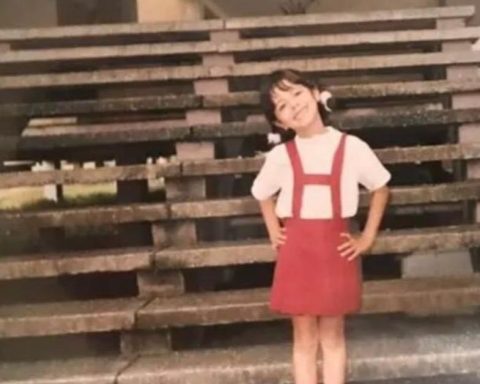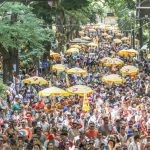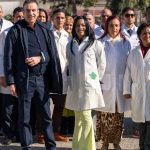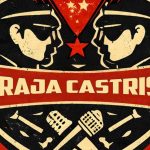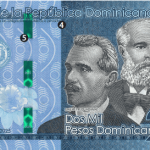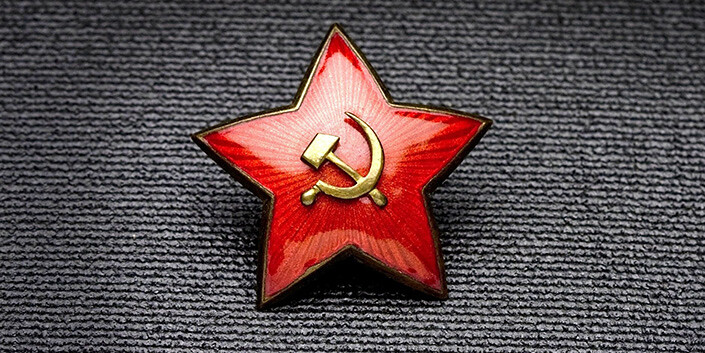Trojes is a very poor village in southern Honduras. I stayed in a typical country house, very humble. However, the food was not lacking. There lived three women and a man who knew life in Cuba well, because many Cubans had passed through there before me.
That made me happy, because Cubans are also waking up their Latin American brothers about the lie that Fidel Castro has invented all his life, continued by Raúl Castro and now by Díaz-Canel. We dismantle that lie wherever we go.
They gave me typical Honduran food, some corn tortillas, dried red beans, and beef, like in a sauce. They also gave me fresh –that’s what they call soft drinks– pineapple and orange.
After resting until two in the morning, we meet at a point where we find a lot of motorcycles, about thirty, to undertake the difficult journey from Trojes to Santa María, where buses are taken to go to Tegucigalpa. It gave me tremendous joy to see so many Cubans, whom I had not seen since I left Managua. All the stress I had disappeared.
The Cuban is also waking up his Latin American brothers about the lie that Fidel Castro has invented all his life, continued by Raúl Castro and now by Díaz-Canel
There was a Honduran there who seemed to be one of the most intelligent of the group and he told me that he liked the Cubans very much because they had the best doctors in the world. I replied that they were also the lowest paid and he told me to tell him. I gave him many examples about the health system, which is sold as an achievement and is trash. He told me that the Cuban doctors who were there on mission were given money by the locals, because they knew that the government was not giving them everything they owed.
That also had an impact on politics there. Many Hondurans I met complained about Juan Orlando Hernández, who was recently extradited to the United States, and he told me that they are happy with Xiomara Castro for now, but that “if she played the funny game, they would remove her.” In the end, when I got on my motorcycle, the man said goodbye to me and said: “Cuban, long live free Cuba!” And he raised a fist at me and tears came to my eyes.
We started to climb mountains, muddy paths, at night, in the midst of tremendous darkness. We were in a caravan of 30 motorcycles, with 30 mounted Cubans. On the way we also passed five vans, which normally carry at least five people and another 15 in bed behind them.
There was an incident on the way, because one of the Cubans fell into a ravine, but he was lucky that both he and the driver got caught in some branches and, with help, they managed to get out. The motorcycle was lost, but the Cuban was put on another and we all arrived safe and sound.
Already in Santa María, the owner of a truck, who had come by a less cumbersome road, said that he was bringing 15 Cubans, three Hondurans assaulted them at gunpoint in the middle of the road and took everything they had. I met those 15 people later, when I arrived in Morales, in Guatemala, but I will tell you later.
There were two yellow buses with just 10 people on them, but many more waiting to complete them. Of course, almost all of them were Cuban, although there were some Nicaraguans and a few Hondurans. We saw each other’s faces and made signs to each other, I said to many: “Free Cuba.” It was very exciting.
The trip to Danlí was pretty smooth, but I had a problem because I made a wrong decision.
The one who was taking me on a motorcycle had entrusted me to a guide who was taking three Cubans. “Hey, please, take care of this little Cuban. Help me there,” he told her. And he replied not to worry. I had to continue on that bus, very uncomfortable indeed, to Tegucigalpa, but the guy told me: “Hey, we’re going to change buses, because we’re very uncomfortable here. It costs five dollars, it’s not much.”
So we boarded the other vehicle – the number of migrants in that city getting on buses to the capital was amazing – after buying something, a pizza, a bread and a hamburger each and a Coca-Cola (all very cheap, like a dollar and a half). I shouldn’t have changed buses. Arriving at a checkpoint called Las Crucitas, we were stopped by two guards, who got on and began to ask everyone for documents.
– Where are you all from?
– From Cuba.
– Passports.
The man left with the passports, crossed to the station, checked them, came back and told us: “Have a good trip.” So, no more. To this day I don’t know if they paid for that or if they let us go just like that.
We passed through some incredible landscapes, many crops, with many cows, and we arrived in Tegucigalpa, a rather gray city. It is very developed, but there they do assault you in a fourth of earth, as we say; They rob you and take everything from you. They tried to take my phone from me when I was taking pictures, but we were able to protect each other.
Something that struck me about Tegucigalpa, something that I had not seen in Nicaragua and even less in Cuba, was the number of children begging. We are not talking about children of 10 or 12, but of 6 or 7 years. “Please, sir, buy me, buy me, which is to be able to bring water home, please buy me.” Children at that age do not have to work.
There, too, I was shocked to see a man, about 40 or 50 years old, smelling something in a large knob. He smelled it hard, he smelled it again, he smelled it again, and I said wow! I had only seen this once, in a documentary, let people smell get off to get high But of course, in Cuba there is no glue for everyday use, much less for that.
I took a taxi to the Sultana terminal, where the buses to San Pedro Sula are taken, and there I met three Cubans – there were Cubans everywhere – who told me their stories, almost all of them, in short, the same. Some said, and that was what bothered me the most: “No, political problems don’t interest me.” I have heard that everywhere. People who are not interested in politics, or political prisoners, or anything.
Those three Cubans I met there were from the East. One was from Granma, Daniel, a pre-university teacher, who had an animal business that the pandemic took away. He left for Jamaica, where everything was very expensive, according to what he said, and then Costa Rica or Panama. He later went to Nicaragua and now just like me. The other two were from Las Tunas, one an engineer, who told me that he had parachuted. The vast majority were 40 and under, many young people 25 or 26 years old.
I had to give the man who was my contact at the Sultana fifty dollars more, after hearing how he argued with my coyote because the money he had given him seemed little. According to the man, they took me to a place very close, where there were many more Cubans, Haitians, Hondurans, of all Central American nationalities. There was even a Russian woman -or from a neighboring place- who came with a Cuban. There were so many people that they didn’t have enough buses to ride them to San Pedro Sula.
The trip was hard, about seven hours, with many curves, and in those ‘banquetas’… but San Pedro Sula is beautiful
I talked, before taking one, with Lauren, a Cuban from the east who had lived in Havana for many years, about 30 years old, very alert, very pretty. Her husband paid for her trip and she went alone, although he had a child of about six years old whom he had decided not to take with her. So, we decided to go down the road together.
Every seat was taken, and in the aisle there were about five or six more people sitting on buckets or plastic stools. A man, a little older, complained a lot that they deceived him, because they told him that they were going to take him by car from Nicaragua. He is one of those who were going to pick up visas in Cancun and they had been promised that way. My friend Lauren had the same thing happen to her.
The trip was hard, about seven hours, with many curves, and in those banquettes… but San Pedro Sula is beautiful. There, after a taxi ride, they placed us in a motel full of Cuban migrants. someone put there Homeland and Life and it was very exciting to hear that: everyone sang it.
In that room of little hotelWe were five men and three women. Two of them were brothers and were traveling to reunite with their families in the United States. They had left their mother in Cuba and that hurt them a lot. I saw them crying. One, who killed cows there, told me: “My chest hurts, because I think I’m not going to see my mother anymore.”
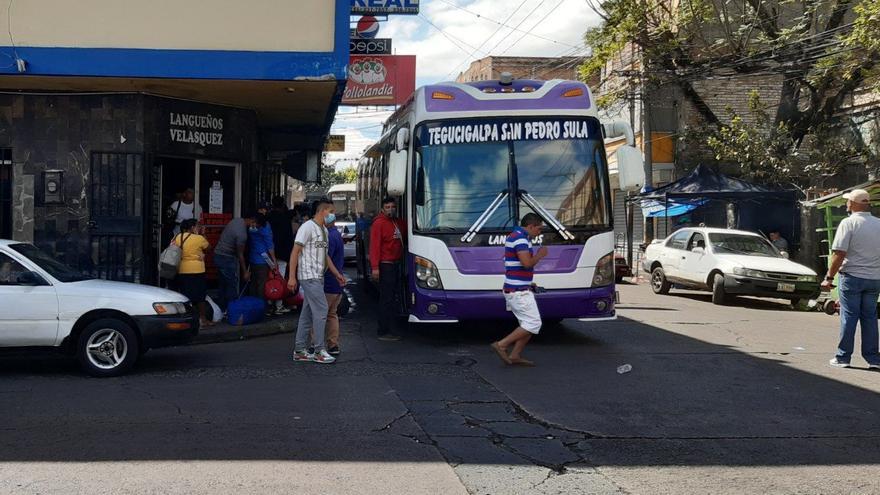
He talked about the future being in the Yuma and not in Cuba, that he was going to work and get ahead, but he also told me that politics did not interest him. There was also another girl from Cienfuegos who told me something similar, and that she had left two children there, one 10 and the other 12 years old.
That night people continued to arrive from everywhere, but the important thing was to take a look, because they warned us that we had to leave early. I had to sleep on the floor, there were pitched battles to charge the cell phones. We bathed as best we could, because the shower had a very small trickle and the water was cold, and we left around four in the morning.
They had told us that we probably wouldn’t all fit, so I said: “Let’s sit near the entrance, because that way we can get a seat on the bus.” And then the gangsters stopped, because they don’t have another name, they organized us more or less and opened a small door through which they began to take us out three by three. We were 177 people, 170 of whom were Cubans.
Morning:
Armed coyotes, powerful Toyotas to cross Honduras
________________________
Collaborate with our work:
The team of 14ymedio is committed to doing serious journalism that reflects the reality of deep Cuba. Thank you for joining us on this long road. We invite you to continue supporting us, but this time becoming a member of our journal. Together we can continue transforming journalism in Cuba.


